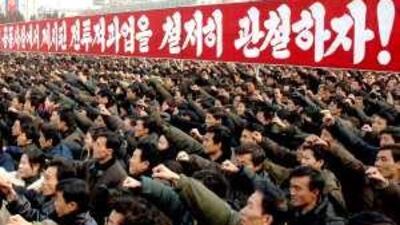WASHINGTON // A "growing worldwide demand" for personal and political freedom was met by "pushback" by many resistant governments last year, with the human rights situation in China worsening and the Middle East experiencing some declines - and a few improvements - according to the US State Department's annual human rights survey. Karen Stewart, the department's acting assistant secretary for democracy, human rights and labour, said this week that a "disturbing number of countries" imposed "burdensome, restrictive or repressive laws and regulations" against non-governmental organisations and the media. And many activists were "harassed, threatened, arrested and imprisoned, killed or subjected to violent ? extrajudicial means of reprisal" in the course of their peaceful work, she said.
The report assessed the human rights situation in every country in the last calendar year by looking at basic freedoms such as speech, press and religion; political, civil, worker and women's rights; and the strength of democratic institutions, such as the judiciary. US diplomats gathered information from government officials, activists, academics, journalists, jurists and other sources. The report singled out several countries for human rights setbacks. It said that in Egypt, the government's respect for freedoms of speech, press, assembly and religion declined (the recent release of the political prisoner Ayman Nour was not considered, as it came after the review period). In Iran, the report said, authorities intensified their "campaign of intimidation" against reformers, journalists and others "through arbitrary arrests, detentions, torture and secret trials that occasionally end in executions".
North Korea's human rights record remained "abysmal", with the report citing government control of most aspects of private life as well as killings, disappearances and arbitrary detentions. China's record was "poor" and had even worsened in some areas, according to the report, with authorities harassing dissidents, repressing minorities and suppressing basic rights. In several post-Soviet countries, including Russia, previous democratic gains "were reversed or the slide towards authoritarianism continued". Media often could not operate freely, with journalists being harassed or killed and operating in a climate where laws did not protect freedom of expression, but rather restricted it.
The report noted some successes, including the enactment of comprehensive legislation to fight human trafficking in Oman and Bahrain and the extension of labour protections to expatriate household employees in Jordan. And despite a deteriorating situation in the Congo, the report also noted some gains in Africa, where Angola held its first elections since 1992 and Ghana and Zambia likewise staged "peaceful, orderly and democratic" votes.
In releasing the report in Washington on Wednesday, Ms Stewart noted that the United States was "mindful" that its own human rights record has come under increasing scrutiny; activists here and governments around the world have criticised the US for some of its counterterrorism policies, including harsh interrogation techniques that were used on some terror suspects that many consider torture. But Ms Stewart said the US remains committed to meeting its obligations under international human rights treaties and quoted Barack Obama, the US president, in saying in his inaugural address that "we reject as false the choice between our safety and our ideals".
"We do not consider views about our performance voiced by others in the international community - whether by other governments or non-governmental actors - to be interference in our internal affairs, nor should other governments regard expressions about their performance as such," the report said. "We and all other sovereign nations have international obligations to respect the universal human rights and freedoms of our citizens, and it is the responsibility of others to speak out when they believe those obligations are not being fulfilled."
Ms Stewart suggested human rights abuses are a symptom of "deeper dysfunctions" within political systems and said the most serious ones "tended to occur in countries where unaccountable rulers wielded unchecked power or there was government failure or collapse". eniedowski@thenational.ae

